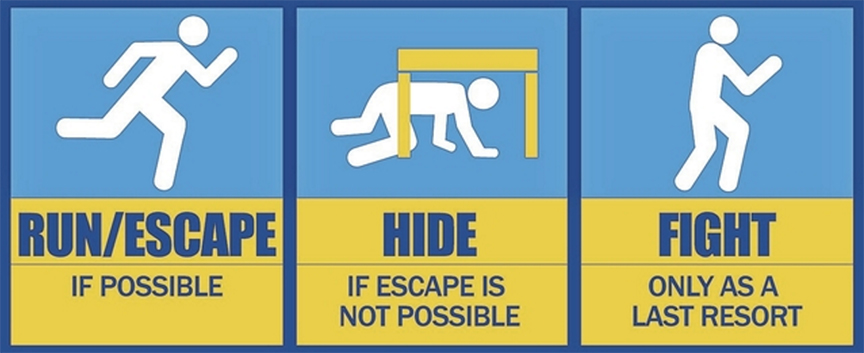Security Advises To Run, Hide, Fight During Active Shooter Workshop
“The thing that will save you is the actions you take,” emphasized Konrad Motkya, during a presentation at Mercy College about active shooting situations.
Taking place on Oct. 16 at the Lecture Hall, led by the Department of Campus Safety, Motkya gave vital tools and tips to survive in the event of a potential shooting. Notably, he taught the concept of “run, hide, or fight.”
“Always prioritize yourself first,” said Motkya.
Run, hide, or fight are the three thought processes one should have if they find themselves in an active shooting situation, he said.
First, one should attempt to run away in a manner that is away from the shooting and toward safety, presumably an exit. From there, one should try to help by grabbing others heading toward the danger and recommend them to not go toward it.
If that choice isn’t possible, then one should try to hide, said Motkya. This means turning off the lights, barricading oneself inside a room, turning off any phone alarms or ringtones, and being as quiet as possible until help can arrive.
In the worst-case scenario, one should try to fight the shooter. This means making a weapon out of whatever is around oneself and taking any steps necessary to disarm and stop the shooter until law enforcement can arrive.
“Don’t be a helpless victim. Be flexible based on where you find yourself,” stressed Motkya.
Motkya pointed out that there has been a general shift in the desire for active shooting training: “The tide has changed. People used to not want the training, but with everything that’s been emerging, those same people are now encouraging it.”
He pointed out that a shooter isn’t limited to a certain set of characteristics. By showing shooters such as Aaron Alexis (Washington Navy Yard), Seung-Hui Cho (Virginia Tech), and Tashfeen Malik (San Bernardino), Motyka pointed out that anyone is capable of violence.
“People cannot assume by looking at someone if they pose a threat. There are no stereotypes in a bad guy.”
This remains true to a certain extent. According to data from Mother Jones, the racial profiles of mass shooters mirror racial demographics in the United States.
Motyka also explained that any place can be capable of hosting a shooting situation.
“It can happen in a variety of locations. One always needs to consider that. Every location needs to be thought out.”
He then stated that almost 75 percent of shootings were random. Despite this, he pointed out how most active shooter attacks are planned.
While there are certain characteristics that follow mass shooters, such as a fixation on past shooters, an interest in stockpiling firearms, playing violent video games, it is vital that one does not equate one of these signs to someone who has the ability or wish to harm anyone else.
According to the Gun Violence Archive, there have been 341 mass shootings in the United States in 2019 as of Oct. 21. This surpasses the 2018 total of 337 reported by the GVA.
Their definition of a mass shooting is “Four or more shot and/or killed in a single event [incident], at the same general time and location, not including the shooter.”
It is vital for any Mercy student, staff, or faculty member to be registered with Mercy Alert. In the event of an emergency on campus, it will notify one through email, text (SMS,) or a phone call (assuming the situation is appropriate for the latter.)
“If you have not already done so, you are strongly encouraged to log in and update your profile in Mercy Alert to receive messages to other communication methods, such as your personal email address or cell phone. This notification system will serve as the College’s primary communication method for weather events and other emergencies,” states Mercy’s website.
Motyka stressed that if one receives an alert while off-campus to stay off-campus. If one is on campus, they should get out of immediate danger.
“If there’s an emergency, don’t expose yourself or interfere.”
He stressed that Mercy would rather have students safe in their dormitories than attempting to do anything else since they can monitor and protect the living spaces on campus much more than other settings.
In a survey given out to Mercy students, gauging their opinions on various security-related issues, an overwhelming amount of students displayed an anti-gun consensus.
It gave students four questions to answer, with the choices of “yes,” no,” or “maybe,” with an opportunity to further explain their answer if they desired.
The first question asked, “Have you ever owned or have any interest in owning a firearm? Why?”
About 61 percent of the surveyed students had no desire to own a firearm. The rationale from those who further explained why centered on the benefit of owning a gun.
“They’re too dangerous, and I am already a trained martial artist,” said Emily Regal, Senior, Behavioral Science.
Despite many of these answers, about 22 percent of questioned students desired an interest, “I have an interest in owning a gun for protection, hunting, and recreational use,” said one junior, looking to major in History.
Another question asked, “Do you feel that you would be prepared if there were to ever be a shooting incident? Why?”
The numbers stated 74 percent of students said that they would not be prepared.
With answers varying from the randomness of an active shooter situation to the lack of formal training through the school levels, many students did not feel comfortable.
“It depends on the location at the time. So physically prepared? Maybe. Mentally though? Nope,” said one sophomore majoring in Cybersecurity.
Regardless of this, 26 percent of the students said they would or might be prepared.
“I am a third-degree black belt,” said Emily Regal, Senior, Behavioral Science.
Students were then asked, “Do you feel that a security team is adequate enough to protect students in schools? Why?”
Only 13 percent of students found security as enough. “With all the security guards on campus, students should feel safe enough,” said one senior.
However, nearly 70 percent of students felt otherwise.
“The campus is far too large for the minimum amount of security that there is. On the New Rochelle campus, I have only seen one guard. Now imagine if something happened there?” said Shannon, senior, and history and education major.
Finally, students were asked, “Do you feel that the United States’ gun laws are enough? Why?”
Once again, most of the students sided toward one point, as around 68 percent felt that the laws weren’t strict enough.
The consensus focused on how easy they saw it was to own a firearm, as best summarized by Michael, a senior at Mercy.
“When laws aren’t able to keep guns out of psychopaths’ hands and a kid could even start shooting, then the laws aren’t adequate enough.”

Steven Keehner was the Managing Editor of the greatest publication on the Hudson.
Hailing from the mediocre Town of Oyster Bay, New York, he enjoys...








